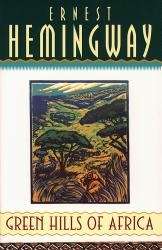The Green Hills Of Africa

Editorial Scribner
Fecha de edición febrero 1996
Idioma inglés
EAN 9780684801292
304 páginas
Libro
encuadernado en tapa blanda
Resumen del libro
His second major venture into nonfiction (after Death in the Afternoon, 1932), Green Hills of Africa is Ernest Hemingway's lyrical journal of a month on safari in the great game country of East Africa, where he and his wife Pauline journeyed in December of 1933. Hemingway's well-known interest in -- and fascination with -- big-game hunting is magnificently captured in this evocative account of his trip. In examining the poetic grace of the chase, and the ferocity of the kill, Hemingway also looks inward, seeking to explain the lure of the hunt and the primal undercurrent that comes alive on the plains of Africa. Yet Green Hills of Africa is also an impassioned portrait of the glory of the African landscape, and of the beauty of a wilderness that was, even then, being threatened by the incursions of man.
Biografía del autor
P B Ernest Hemingway /B (Oak Park, Illinois, 1899) forma parte ya de la mitología de este siglo, gracias no solo a su obra literaria, sino también a la leyenda que se formó en torno a su azarosa vida y a su trágica muerte. Hombre aventurero y amante del riesgo, a los diecinueve años, durante la Primera Guerra Mundial, se enroló en la Cruz Roja. Participó asimismo en la Guerra Civil española y en otros conflictos bélicos en calidad de corresponsal. Estas experiencias, así como sus viajes por África, se reflejan en varias de sus obras. En la década de 1920 se instaló en París, donde conoció los ambientes literarios de vanguardia. Más tarde vivió en lugares retirados de Cuba y Estados Unidos, donde, además de escribir, pudo dedicarse a una de sus grandes aficiones: la pesca, un tema recurrente en su producción literaria. En 1954 obtuvo el Premio Nobel de Literatura. Siete años después, sumido en una profunda depresión, se quitó la vida. Lumen ha publicado sus novelas I Adiós a las armas /I ; I Por quién doblan las campanas /I ; I Verdes colinas de África /I ; I El viejo y el mar /I , por la<br> P que recibió el Premio Pulitzer en 1953; el libro de memorias I París era una fiesta /I ; sus I Cuentos /I , recopilados por el propio autor, y su primer libro de relatos, I En nuestro tiempo /I .<br>








